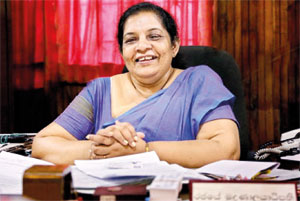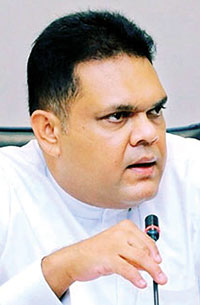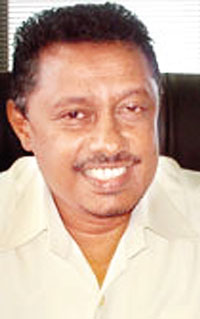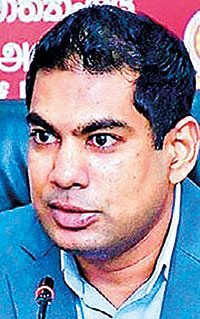Columns
Beware: Deny the right to vote at the government’s own peril
View(s):- Refusal to hold March elections may drive people to anarchists’ arms
If it fails or is reluctant to provide the necessary financial wherewithal to the Election Commission to hold local government elections before the constitutional deadline, it risks being charged with dereliction of duty.
Throughout these last two months, the government’s manner and conduct have left much to be desired. It has fallen far short of the high standards expected of it to uphold and maintain, at a time when elections have been gazetted and public interest in it has spontaneously risen to a fever pitch.
But instead of assisting the polling process, it seeks to slam the brakes. Instead of readily granting the Rs. 10 billion already allocated in December’s budget, it dons the pauper’s loincloth and pleads poverty; but finds no qualm or blush to emerge from the ranks of penury, to celebrate Independence Day with kingly pomp and pageantry.
But what’s the value of freedom in a country where the constitutional right to the franchise can easily be put on hold at the government’s arbitrary will?
It’s becoming increasingly clear that the Government is bent on scuttling plans to hold local government elections on March 9 as gazetted on February 1st. The way it proceeds to do it does not reflect a single ray of redeeming goodness but serves only to cast it in furtive bad light.

TREASURY SEC MAHINDA: No money, no polls
The latest, in a series of bids to buckle it, has been a Treasury circular informing all government institutions that the Treasury’s permission must be sought and obtained ‘before entering into commitments, regarding capital expenditure items over Rs.500m’.
Furthermore, in its circular dated February 27, the Treasury warned that if its permission was not obtained, ‘the relevant officers will be personally liable for such expenditure.’
Coincidentally, the same day, the Election Commissioner handed over the ballot printing order to the Government Printer and its web presses were ready to roll.
This put Government Printer Gangani Liyanage in quandary. The past practice had been to print the ballot papers and then receive reimbursement from Treasury. True, that she had a constitutional duty to assist the Election Commission after elections had been gazetted, but to pursue the past practice without the Treasury’s consent would expose her to a personal liability of over Rs. 500m.
Overawed at this alarming prospect, she, understandably, played safe. Till she sorted matters out with the Treasury, the printing of ballots was stopped. As a result, postal voting, which was scheduled to start on February 22, has been postponed.
On Friday came the killer stab which placed the right of the people to the franchise good as dead. Treasury Secretary Mahinda Siriwardena told the Election Commission that the Treasury couldn’t ensure ‘if funds could be provided on a continuous basis for the local government elections.’

GOVT PRINTER GANGANI: In a quandary
What? A hand-to-mouth existence for 42 percent of those below the poverty belt and a hand-to-mouth election for all the rest? What on earth happened to the Rs. 10 billion earmarked for elections in the budget that Parliament approved two months ago? Had it been diverted to meet other questionable expenditures not authorised by Parliament? If so, who touched the election kitty as if it were their own piggy bank to draw from?
The Treasury Secretary cannot use the country’s economic crisis as an excuse. The economic crisis didn’t suddenly land on the nation’s doorstep, but was foreseen much in advance. Giving this lame duck all-encompassing excuse is nothing more than a feeble attempt to postpone a politically unfavourable election to the Government. It has become the clichéd cover trotted out to do or not to do, for anything the Government may like to or dislike to do.
For example, to dish out 200 million bucks to celebrate independence, the excuse is tendered that it’s because of the economic crisis that we must show the world we can still celebrate. But to hold elections and show the world the infinitely more impressive depiction that, no matter how down and out we are, we still value the right to the franchise, the excuse is given that it’s because of the economic crisis, we can’t hold elections.
With such a Government, aided and abetted by a slavish, servile, spineless bureaucracy that has become nothing more than a repulsive politicians’ spittoon, what chance is there for the public to expect ethical conduct from those selected to office?
Nor can the Treasury Secretary absolve himself of all responsibility for the Rs 10 billion specifically reserved for election expenses in last December’s budget. Merely saying the coffers are bare to deny the people their right to vote, simply will not suffice. The entire political and public service establishment has been placed on notice that accountability for any acts or omissions done whilst in office will relentlessly shadow them even after they leave office, as a Supreme Court 7 judge-bench made expressly clear in December.
Further, it was reported on Friday night that another Finance Ministry circular has been issued dated February 14, that henceforth all public expenditure on non-essentials must first be approved by the President cum Finance Minister Ranil Wickremesinghe.
Finally, the election buck has stopped at the Presidential table. And it is to be hoped that the lifelong liberal democratic President will consider the holding of the elections in March, before its constitutional deadline expires, as one of paramount importance and ultra-essential to the democratic life of the nation.
He will capture two birds with one stroke of his Mont Blanc pen which he received from well-wishers at his 50-years-at-the-Bar celebrations at Shangri-La last year. One, he will demonstrate to the world, he is a stickler for democratic traditions, a committed believer in the Rule of Law, an ardent upholder of the supremacy of the Constitution.
And two, equally demonstrate to the Lankan people that, despite the heavy crown he wears on his head, despite the painful ordeal of bearing the orphaned Lankan child across the derelict Caucasian bridge to safety, he hasn’t lost sight of his constitutional duty under Article 33(c) ‘to ensure the creation of proper conditions for the conduct of free and fair elections, at the request of the Election Commission’, and that finance will be no object to make this prime requisite of a Democracy available to the people in March: the right to the franchise.
Else, if elections are denied come March, another uprising is on the cards. One that may not be as peaceful as the struggle on Galle Face Green. Nor one that can be easily squashed by a sledgehammer but one violent in nature that can end in bloodshed. The Government should not shove the nation into the waiting arms of the anarchists beating at Democracy’s gates.
| How PUCSL Chief’s dethroning suddenly solved the power crisis Public Utilities Commission Chief Janaka Ratnayake was left stranded and alone on Tuesday when the other three members of the commission did a sudden U-turn and withdrew their opposition to the Government’s electricity tariff increase.  SEMASINGHE: Accuser Now consumers face an average 66 percent increase in their electricity bills following the mutiny of the rest of the commission members, namely, Chathurika Wijesinghe (Secretary), Douglas N. Nanayakkara, and S. G. Senarathne. With the rug pulled under his feet, the commission’s chairman Ratnayake had no option but to retreat into the shell of his defeat to nurse the wounds suffered in his fight to keep electricity price hikes at bay. The only pearl of comfort he would have found therein would have been the knowledge that he had ceased to be the Rock of Gibraltar blocking the IMF bailout and preventing Lanka’s economic recovery, as claimed. Just last Sunday, two days before the Twisted Tales of the Unexpected had begun to unfold, State Finance Minister Shehan Semasinghe blamed Ratnayake for being a prime obstacle to the Government’s attempts to obtain IMF Board approval for the elusive bailout loan. Semasinghe told newspapers: ‘Ratnayake has become a big obstacle to the unlocking of the IMF bailout package. One individual acting in this manner puts the entire country in a serious situation. If people are blocking this, I think the public should be vigilant of those people.’ Alas, we have no clue as to what the IMF terms exactly are since the Government has repeatedly refused to reveal them. Hence, we have to take State Minister Semasinghe’s word for it, even as we have to take the Government’s word for every harsh measure it imposes on the public in the IMF name. But did Ratnayake, singlehandedly, hold the country to ransom? The President told Parliament on December 8th last year that if an electricity price hike is imposed by the relevant Ministry, the PUCSL has no authority under the Act to act in a manner that is incompatible with the said decision. He added that he should know since he himself had drafted the Act. If, as the President had said, ‘the power of making this decision lies with the relevant Minister and the Cabinet,’ why wasn’t this power used to remove the Ratnayake thorn from the IMF Board’s flesh, as claimed by Minister Semasinghe to be the real obstacle, to expedite the bailout facility months ago? Why did the Government have to wait until his balloon was deflated mid-air by the rest of his colleagues on the commission? Perhaps, Semasinghe has still not fully grasped the IMF role and its brief — forgivable since he is new to the job — and has failed to fathom that it is not the Ratnayake thorn but the Chinese bamboo splinter that’s irking the IMF flesh. That it’s ‘good friend’ Communist Red China that’s holding Lanka to ransom, not the evil Ratnayake. Last month India came out strongly to bat for Lanka and offered financial assurances that scored well to win IMF applause. All China offered to bring to the crease was a two-year moratorium on a USD 2.7b debt, with the balance mid-and long-term loans of USD 5b to be negotiated with Lanka alone.  RATNAYAKE: Deflated As the Sunday Punch commented two weeks ago: ‘to expect Lanka to have made sufficient economic recovery to start repaying the capital and interest in two years is to expect nothing short of a miracle.’ Despite this setback, there was some comfort for Lanka when the all-important Paris Club announced its readiness to provide financial assurances to Sri Lanka. However, without all three major sovereign creditors tendering financial assurances acceptable to the IMF Board, even the Paris Club’s show of support cut no ice. On February 10, with only China holding out, the IMF gave its update on Sri Lanka. It said it will depend on securing assurances of debt relief from its bilateral creditors. ‘As soon as adequate assurances are obtained and remaining requirements are met, including by the Sri Lankan authorities, it can be presented to the IMF’s Executive Board for approval.’ As said before, what these remaining requirements exactly are, we simply do not know. All we know is that as long as the cloud of secrecy over IMF terms remains without dissipating, the IMF spectre will continue to be used as the bogeyman, a convenient alien ‘goni-billa’ to scare the living daylights out of the public, if they do not swallow the local witchdoctor’s politically blended brew. Except, of course, when it comes to the decision not to hold elections, since such a decision is contrary to the internationally prescribed method to test the public pulse to make sure the patient is still alive after the IMF measures have been administered. And that’s not all. With Janaka Ratnayake, the man unfairly blamed as hoodoo incarnate that haunted the landscape and jinxed the IMF bailout, whom neither the Minister nor the Cabinet, with all their existing legal powers as claimed, could exorcise and only sorcery could compel his downfall, exiting the stage on Tuesday, a remarkable change seems to have dawned on the island’s fortunes.  WIJEYESEKERA: Accuser Shiploads of oil and coal seem to have suddenly arrived at the port, the heavens seem to have suddenly sent their full measure of rain to fill reservoirs to spill levels; and the nation’s skinflint Power Minister, Kanchana, who had hitherto hoarded his electricity stock as a miser his gold, and had refused to grant uninterrupted supply to enable students to study for their A’ level exams, suddenly finds enough room in his heart to accommodate the request and lifts the power cuts without further ado. Perish the thought, but was the Minister holding hostage the people’s legitimate right to electricity, till the independent statutory consumers’ guardians, Ratnayake and PUCSL colleagues, caved into his ransom demand for a further price hike? Was it the intention to brand Ratnayake and the other Commissioners as Public Enemy Number One and rouse public anger against them as being the main reason for power cuts? And, with Finance State Minister Semasinghe blaming Ratnayake as the prime obstacle to the IMF deal, did the Minister stage a two-pronged attack to coax the other PUCSL members to leave their chairman to the wolves? Now that the coup de grace has been finally delivered, will the mirage of a country awash with electricity, soon disappear? Leaving us to experience only the shock we’ll get next month when we receive the electricity bill 66 percent higher than usual. | |
Buying or selling electronics has never been easier with the help of Hitad.lk! We, at Hitad.lk, hear your needs and endeavour to provide you with the perfect listings of electronics; because we have listings for nearly anything! Search for your favourite electronic items for sale on Hitad.lk today!


Leave a Reply
Post Comment